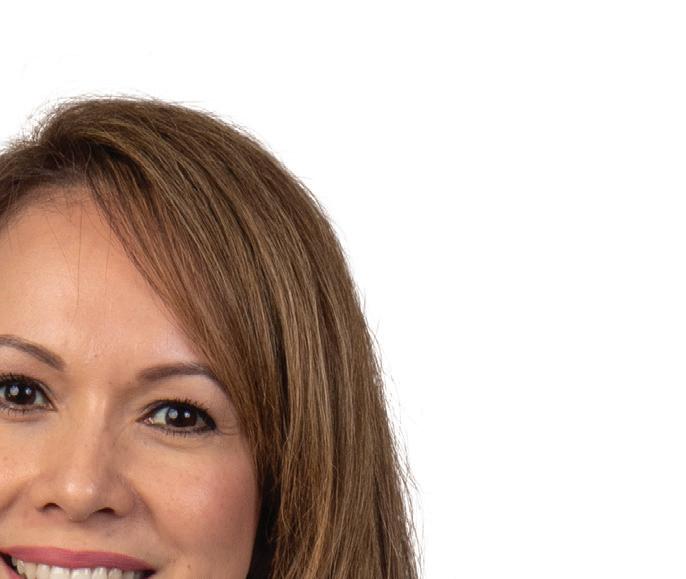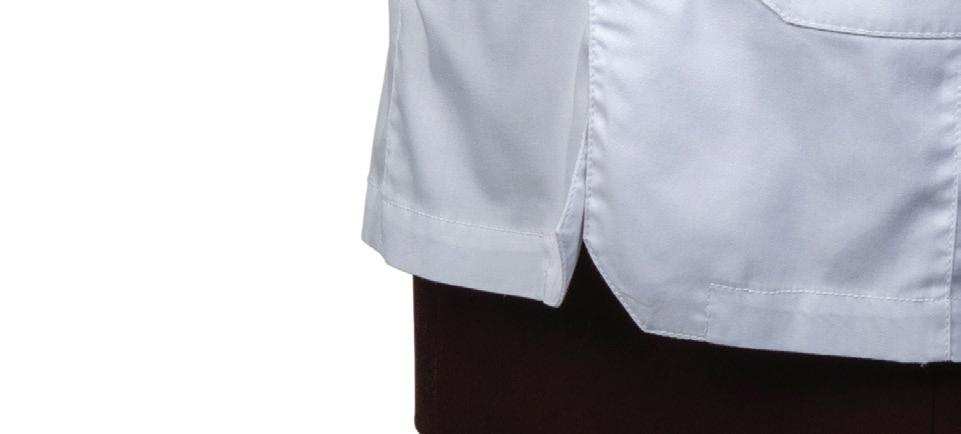Update of the week page 3
Collegedale Train Derailment: Case Closed After Three Years

Update of the week page 3
Collegedale Train Derailment: Case Closed After Three Years
Pressing Issue page 2
School of Social Work Senior Policy Trip Canceled Due to Government Shutdown

Lily Mutai Contributor
Southern Adventist University’s School of Nursing has officially relocated its simulation lab to the newly renovated Miller Hall.
Nursing is the largest major at Southern. Due to high demand, the program recently increased its acceptance rate from 72 to 84 students per semester. To accommodate this growth, the School of Nursing
expanded its simulation space by moving to Miller Hall.
“We only had three designated simulation rooms/areas in AdventHealth Hall and only two of the rooms could be run at the same time due to our AV license," stated Cindy Johnson, professor of nursing and simulation coordinator. “We now have seven patient care rooms and a room for community health, where students can experience a ‘home visit.’ All of the rooms can be run at the same time.”
According to Johnson, the additional space will allow students to use the lab more than once a semester, which was previously the limit. During these sessions, students take on the role of registered nurses. They practice making clinical judgments, prioritizing patient care and responding to critical situations.
“This is the beauty of simulation,” Johnson said. “This is a safe place for students to learn.”
The new simulation center includes
several upgraded technologies, most notably a new audiovisual (AV) system that records students as they complete simulations. Students can then review their footage, annotate feedback and submit self-evaluations to their professors. In addition to the AV system, the new building has patient rooms set up to mimic a real hospital, with IV pumps and other equipment. Johnson added that a newly installed air compressor enhances realism even further.
See Simulation Lab on page 3
“We now have seven patient care rooms and a room for community health, where students can experience a ‘home visit.’ All of the rooms can be run at the same time.” -Cindy Johnson
Anaya Miller Contributor
Due to the government shutdown beginning on Oct. 1, the School of Social Work’s Social Welfare Issues and Policy (SWIP) class will not be going on its planned trip to Washington, D.C. Had the trip not been cancelled, 10 seniors would have made the journey on Oct. 8.
The Friday before the trip, Kristie Wilder, a professor in the School of Social Work, monitored the government shutdown for news that would affect the class trip. She received an email confirming the cancellation on Monday, Oct. 6. Wilder explained that the yearly trip involves students meeting lobbyists from the Council of Social Work Education firm. The lobbyists typically provided feedback to the students for their class assignments.
After meeting with the lobbyists, the students would meet with members of Congress according to their state of residence and home district. At the meetings, the students would discuss the policies they had tracked throughout the semester with their representatives.
“That’s the major objective of the trip,” Wilder said during a phone interview. “To demystify this experience of advocating with our lawmakers. ...We had about six different policies this year. They get to see why policy is so important to social work and the people we serve and that the system is not intimidating to approach.”
After visiting Congress, the students would take a tour of the Capitol, the Supreme Court and the Library of Congress. If there were hearings at court, the class would sit in.
At the library, the students would get their own library cards and conduct research for their class. On previous trips, the class also visited the ADRA office to hear about how policies impact their work and the church. The students visited monuments and memorials in Washington as well.
“It’s a very special trip,” Wilder said. “I was very sad for this group to miss out.”
Students were also upset that the trip was cancelled. Caeli Hensel and Elsie Kroll, senior social work majors, both spoke about their disappointment.
“The SWIP trip to Washington, D.C. is an experience I have looked forward to since my freshman year, after hearing about it from the social work seniors of 2023,” Hensel said.
“I planned to advocate for H.R. 4769, the Foster Youth Mentoring Act of 2025, which would provide funding to support mentorship programs for foster youth.”
Kroll had also been looking forward to the trip.
“With this being my senior year, I was really looking forward to a trip with all of my classmates, to have time outside of class to bond,” she stated. “In the class, we have been preparing to talk with representatives about a bill that is in Congress right now. Because
of the government shutdown, they are no longer in D.C.” Wilder explained that the shutdown had also affected the Smithsonian system, which would have prevented the students from touring the museum. All tours of the Capitol had been canceled, and the Supreme Court was closed. The class meeting with Tennessee’s representative Charles Fleischmann was also canceled.
“There was no way to make it a productive trip,” Wilder said.
When asked why the trip was so important to the social work students, Wilder explained that it’s easy to think of direct practice when it comes to social work, but it can be challenging for students to connect policies to people’s lives and mental health.
“When they take this out of the classroom and get to do experiential learning, it sticks with them,” Wilder said. “I’ve been doing this for fourteen years, and I still hear from students that this was the time that all the dots connected for them.” Hensel commented on another benefit of the trip.
“The trip offers the senior social work class a valuable opportunity to spend time together outside of the classroom and build meaningful friendships,” Hensel stated. “This is especially important during senior year, when there are many group projects and shared challenges, allowing us to relate to one another and provide mutual support as we navigate the year together.”
Wilder emphasized the impact of in-person experiences.
“Sometimes there’s knowledge that can only be understood when experienced,” she said. “That’s why it’s so important. When policy feels stale or like something that doesn’t impact us, they get to go and experience that it does. The elected officials listen; we’ve had some great experiences. Staffers are so grateful for the data and information that the students provide them to help inform [them] how their boss should vote on a bill. It’s very cool.”
Wilder said students now realize the proximity of the effects of the government shutdown.
“I think people see the government shutdown as something we’re removed from and maybe doesn’t have immediate impact,” she said. “But it has real impact, and this is a great example of how it impacted some Southern students directly.”
Hensel shared her perspective on the impact of the government shutdown is having on
individuals and communities.
“A government shutdown is not productive for anyone in any way, and the impact goes beyond canceling the SWIP trip,” she said. “While that was unfortunate for my class, there are individuals and communities that are currently or soon will experience the loss of funds for vital programming.
Alaska just experienced the tail end of a typhoon, causing severe flooding and damage to many of the communities in western Alaska according to NPR. With the government shutdown, federal funds cannot help them. Families who depend on federal funds for food stamps, housing vouchers, or any other resources will soon lose access to those, as funds are actively running out without a new budget being passed in Congress.”
Kroll said, “It is difficult to be so directly affected by something you can’t do anything about”

Mills McArthur Contributor
Editor's Note: This article is part of “Community Voices,” a new section that publishes occasional commentary from members of the community.
There are many reasons to be proud of Southern Adventist University. One of the best reasons, in my view, is the Anton Heiller Memorial Organ. Purchased by Southern, housed in the Collegedale Church and built by the acclaimed organ-builder John Brombaugh, the organ is by far Southern’s greatest contribution to the arts in our 133-year history. Yet, many are unaware of the facts surrounding this remarkable instrument.
We are in the midst of an anniversary. Forty years ago, in 1985, the Heiller organ was first used in a church service. The following year, the organ’s dedication ceremony attracted widespread attention.
“Off tomorrow to Tennessee to prepare for the Brombaugh concert at Southern College,” wrote Juilliard professor Leonard Raver at the time. “Harald Vogel [a
Southern Accent
distinguished organist] tells me it is one of the great organs of the world.”
Vogel was right. The Heiller organ is a masterpiece of workmanship, a historically authentic “tracker” organ with fully mechanical action.
Musicologist Peter Williams once called Brombaugh “one of the greatest craftsmen in the world.” Southern’s instrument has been featured in several commercial recordings, including an enchanting rendition of the minimalist classic Mad Rush. Rumor has it that this very recording inspired the score to the movie Interstellar.
The organ is also the product of grueling effort— over a decade of planning and labor. “Who is behind all of this?” wrote the Accent in 1986. “One person, Judy Glass.”
Glass was hired in 1975 as a professor in Southern’s music department. Almost immediately, she began advocating for a new pipe organ on campus. When she approached Southern’s then-president Frank Knittel, Glass put her job on the line: “I told him that if he was short on dollars, buy an
Editor-in-Chief
The Accent encourages readers to write articles and voice their opinions. However, the views expressed do not necessarily reflect the opinions of the Accent, the Southern Adventist University or the Seventh-day Adventist Church.
For any questions, comments and article submission information, email the editor at haydenjkobza@southern.edu.
For all advertising inquiries, email alvajohnson@southern.edu.
Hayden Kobza
Managing Editor Eliana Morales
News Editor Chloe Smith
Photo Editor Katie McConnell
Opinion Editor Samuel Guerra
instrument first, then hire the teacher.”
Instead, Knittel gave Glass his full support. Along with her husband Dwain, Glass toured America considering potential organ builders. Following the advice of her former teacher Anton Heiller (for whom the organ was eventually named), Glass selected John Brombaugh.
Southern’s original contract with Brombaugh, signed in 1976, called for an organ in the music building. Soon thereafter, Southern hired Brombaugh to build an organ in the church as well, diverting considerable resources away from the music building instrument in the process.
The contract for the church organ was prepared in October 1977 and signed in February 1978; Southern is listed as the only purchaser, with Knittel signing on behalf of the school. The same is true of subsequent amendments to the contract. Similarly, Southern alone hired Ralph Richards and Bruce Fowkes (highly regarded organ builders in Summit, Tennessee) for tonal finishing in the late 1980s.
Lifestyle Editor Rhett Seitz
Religion Editor Nina Bueno
Sports Editor Matthew Taylor
Staff Sponsor
Alva James-Johnson
Social Media Manager Emma Boughman
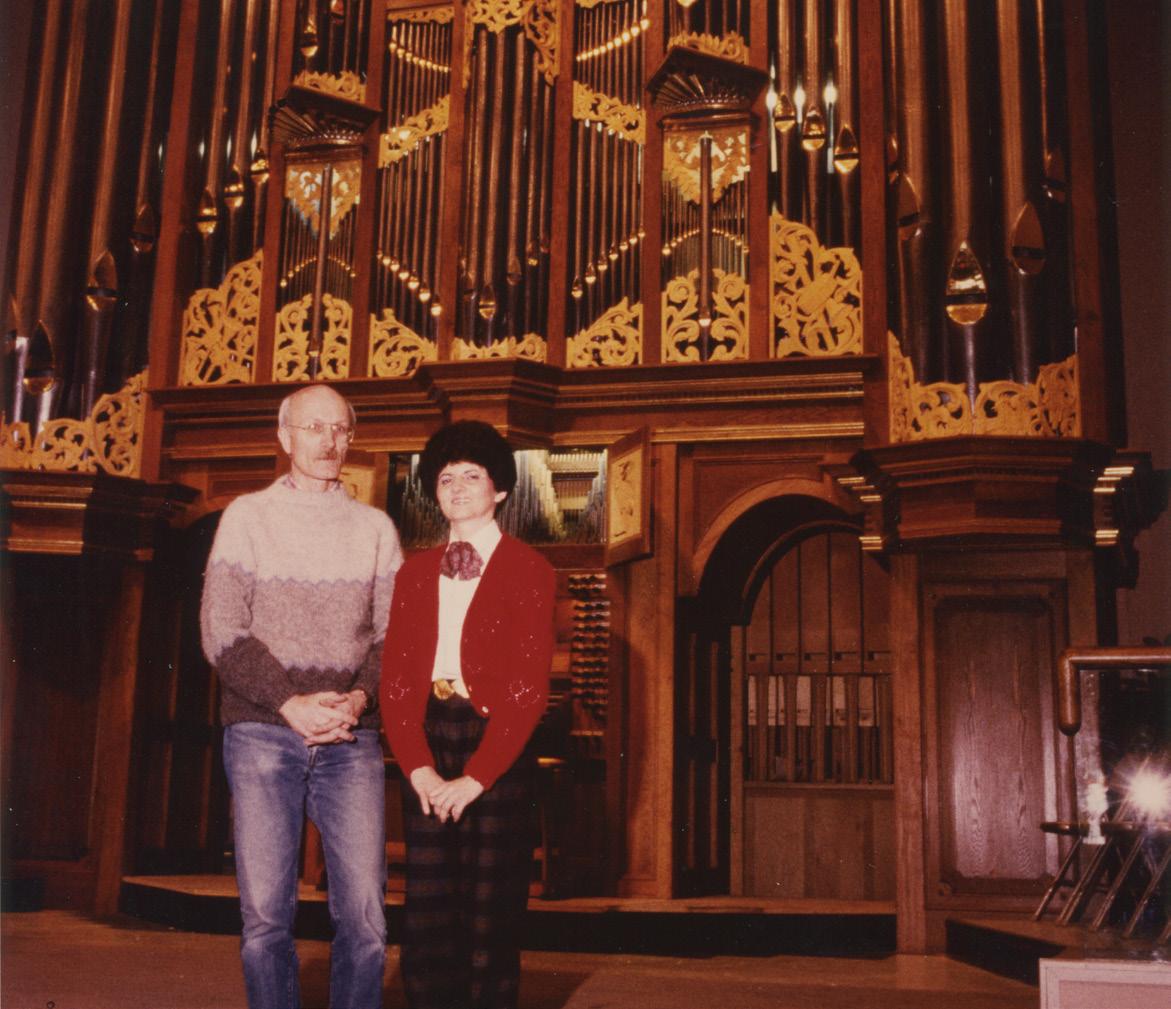
Such historical data are not meant to deny any role of the church or the wider community. The Collegedale Church contributed $50,000 toward the project, roughly 10% of the total cost. Additionally, church members rallied to raise funds for acoustical enhancements to the sanctuary.
Yet, there is no question that Southern took the lead in the organ project. In the end, Southern and its donors supplied at least $432,300,
Web Manager
Eri Jorge
Reporters
Nyah Jackson
Clint Jones
Jehiely Balabarca Ava-Caroline Schmidt
Kyla Wetmore
Collegedale Reporter
Leif Bromme
Circulation Manager
Norelie Cabrera
approximately 90% of the total cost. According to the contract, all parts for the organ were to be labelled “Property of Southern Missionary College.”
Southern is understandably protective of the instrument, which Glass estimates is now worth over $4 million.
A draft of an agreement from 1990, prepared by Southern’s legal counsel, states that the church will “limit Church
Copy Editors Allison Grundy Kyla Wetmore
Photographers
Jaden Segarra
Christian Bass
Layout Designers
Nyah Jackson
Emma Boughman
Ander Aviles
Simulation Lab
continued from page 1
“In the past, we asked students to pretend there was oxygen going to their patients,” she said. “Now, when they apply a nasal cannula or face mask, compressed air comes from the wall, making it very realistic for them.”
Alexis Rice, a sophomore nursing major who uses the skills lab every week, said
Memorial Visit
continued from page 2
personnel access to the Organ to those individuals who have been approved in advance by the College or the College’s designee as being qualified to play the organ.” The question of access raises another question: Why did Southern buy the organ in the first place?
The historical record is clear: Southern purchased the organ for educational purposes. Board of Trustees minutes of February 1978 state that Southern students would practice “on this specific organ.” In 1980, Dwain Glass (who spearheaded fundraising for the project) wrote to a prominent local donor, “The students who become skilled organists as a result of being able to practice on this magnificent instrument will go forth throughout the world to touch the hearts of men and women through music.” The fundraising campaign also
simulation helps students learn from their mistakes before working with real patients.
“By using simulation, there is room for errors and correction of mistakes,” Rice said.
“So, when you actually go to the hospital, you’re able to perform the skills you learn with confidence and without error.”
LaShawn Horton, director of the associate and bach-
assured donors that Southern students would perform on the instrument for church services.
But the organ is not intended exclusively for student performance; its use properly comes at the discretion of the university’s organ professor. Indeed, Judy Glass has long held the title of Church Organist at the Collegedale Church (an unpaid position) and has spent much of her 50-year career in Collegedale performing regularly in Sabbath services. Since the death of her husband in 2021, Glass has preferred to give the spotlight to her students.
Despite Glass’s outsized legacy, her role at the church is hardly unprecedented. It is a longstanding tradition (hailing back to figures like Mabel Wood and Stanley Walker) that Southern’s organ professor doubles as the Collegedale Church organist. It is essential that Glass’s eventual successor at Southern continue to serve in this
elor of science in nursing programs, emphasized that simulation not only improves technical ability but also encourages critical thinking and problem-solving.
“Simulation offers practical ways to apply theory in context,” Horton said. “It also provides a safe space for students to fail. We’d much rather students have a failure in simulation than in the real situation.”
capacity and remain—as specified in church committee minutes from 1986—“responsible for all Worship Services.”
The organ’s place in Southern’s history is clear enough. But a deeper question is at stake: Why does the organ matter? In the dedication service, Gordon Bietz posed a similar question.
“There are those who might say of a work of art, music, or an organ: ‘It has no use. It isn’t practical. What do you do with it?’”
One could give many utilitarian answers. We could mention the academic merits of the organ program. We could mention the instrument’s fame beyond the Adventist system, which confers prestige on our university. We could mention the organ’s role in training musicians.
Most important of all, however, is the organ’s status as art—art executed to the highest standards of human achievement. Bietz’s ques -
University President Ken Shaw also praised the center during its grand opening. He noted both the significance of the renovation and the generosity of donors who made it possible.
“Having state-of-the-art simulators gives our nursing students a chance to gain clinical experience right here on campus,” Shaw said. “It’s an incredible resource that helps prepare them to serve
patients with skill and compassion.”
With the new simulation lab in place, the nursing department leadership believes that Southern’s nursing students will have more opportunities than ever to gain hands-on experience before entering clinical practice.
tion in 1986 was, of course, rhetorical. His homily at the dedication service answers his own question, and in so doing captures the loftiest ideals of our university, our church and our community: “It is this very aspect of art—its uselessness from a utilitarian viewpoint—that makes it so useful. For it calls us from utilitarianism where everything must be used for something. It calls us from materialism where the focus is on getting a return on every investment. It calls us in symbols to reach beyond the visible to the invisible God.”

Madelynn Brower Contributor
A decade ago, Pastor Reginald Horton and his wife, LeShawn, began building a team for a student-led church service: Merge Worship. This year, Merge is celebrating its 10-year anniversary with current students and alumni in attendance. In 2015, LeShawn Horton had only recently begun teaching at Southern’s School of Nursing, where she is now the director of the Bachelor of Science in Nursing (BSN) program.
The couple had just moved from California and were visiting local churches in the area when they came across Orchard Park Seventh-day
Adventist Church, an African American congregation. The amount of student involvement at Orchard Park inspired Horton to build a similar worship service closer to Southern’s campus with a gospel-inspired worship style. Since then, Merge has become a multicultural gathering for students from many different ethnic backgrounds.
“We’re very student-focused and student-led at the same time,” said Caleb Hoffman, a senior computer science major and Merge worship coordinator. “We try to reach out to students with students, and we’re very passionate and focused on building a solid, consistent community of people who just want to worship God.”
According to Horton, students who serve at Merge have the opportunity to develop their individual gifts through service and leadership. Different teams of students are put together to lead in various areas, something that Horton started when he began to develop Merge’s student leadership.
“One of the objectives was to invite students to lead out in various ministries in the church, and what he did was really genius in that he looked at the gifts of everybody that he invited to be on the team [and then] he asked if they would be in charge of that particular area of ministry,” said LeShawn Horton.
Horton is one of the Collegedale Church of Sev-
enth-day Adventists’ collegiate pastors, whose specific role is to oversee Merge, which is under the jurisdiction of the church.
Merge Worship has moved locations several times. It originally met in Talge chapel, then moved to Lynn Wood Hall auditorium and finally set up in the former Collegedale Academy Elementary gym, which serves as its current meeting place.
While Merge is very student-oriented, it also focuses on community outreach. Lorena Horton, who graduated from Southern in 2025 and has worked with Merge for the past two years, spoke about some of the outreach efforts.
“A main point going for-
ward for Merge is definitely community outreach and actually being the hands and feet of Jesus,” she said. “[To] be doers of the Word, and not merely hearers.”
Over the past 10 years, Merge has grown from a small group of 20 students to between 200 and 300 attendees every week.
“On average, we have about 10 [students] a semester who get baptized,” said Horton. “So, we’re not just a worship service, per se, but we’re also an ongoing evangelistic meeting. If you had to really ask me what’s the most powerful thing about Merge, it would be to give students the opportunity to serve God and to accept Him as their Lord and Savior.”
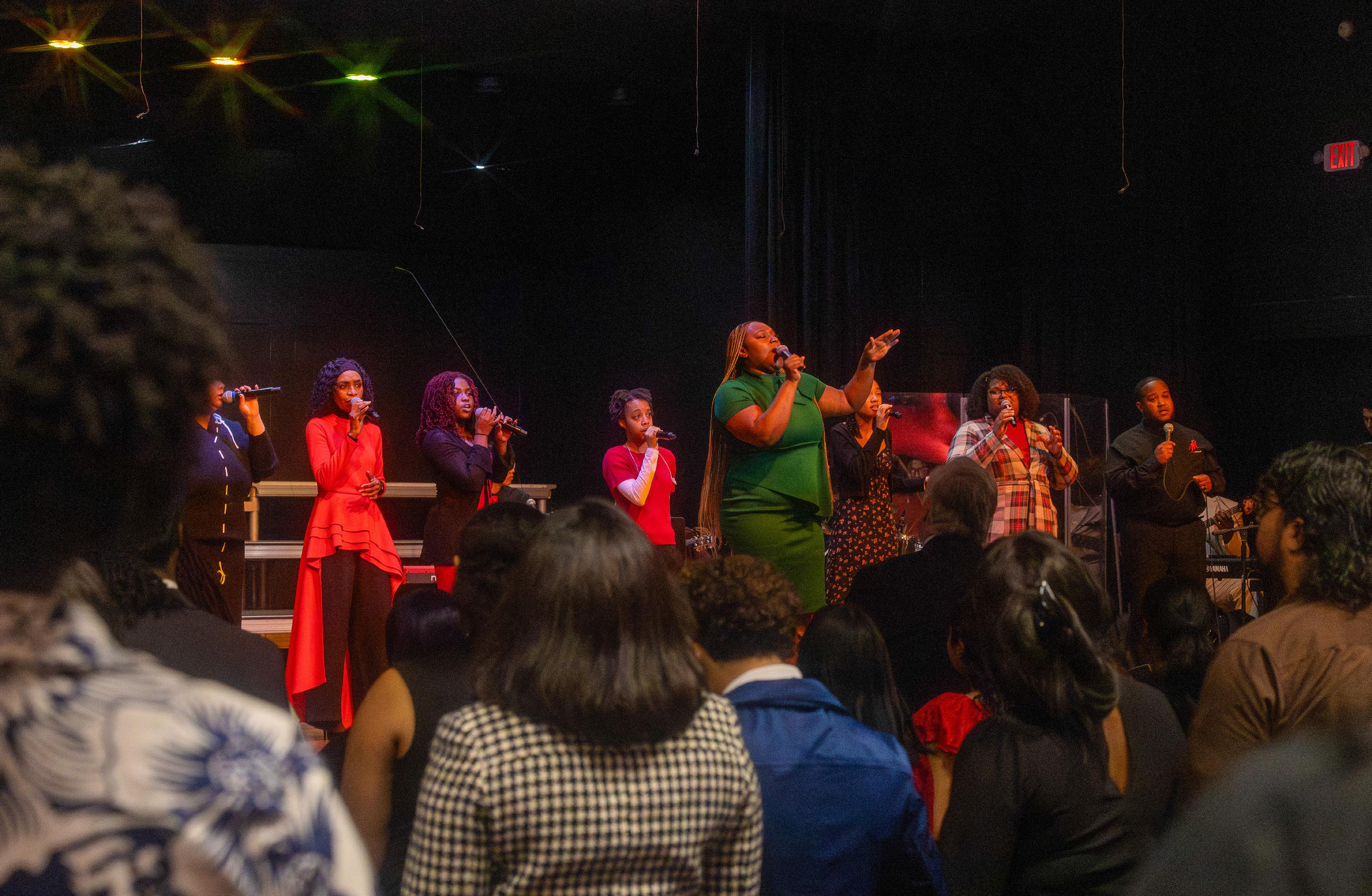
Editor's Note: The Southern Accent has produced a two page Collegedale News section this issue as part of a national initiative to enhance community news coverage. The local effort, led by Southern's School of Journalism and Communication in conjunction with the Center for Community News (CCN) at the University of Vermont, places student journalists at the forefront of addressing the news desert crisis, a phenomenon caused by the decline of newspapers in local communities. The Accent believes local news is vital to a thriving democracy, and we remain committed to reporting about important issues, novel occurrences and interesting people in the greater Collegedale area. We will publish this special section in five issues of the newspaper this semester. To submit tips or press releases, go to https://southern-accent.org.
Nyah Jackson Reporter
On Monday, Oct. 20, the City of Collegedale’s IT Director, Thomas Cook, proposed new Toughbook laptops for the city’s police department to the Collegedale Board of Commissioners. It was brought to the board’s attention that the current computers are four years old, making them outdated. As the new IT expert for the city, Cook has been working on updating equipment that has not been replaced in the last five years.
In an email to the Accent, Assistant Chief of Police Jamie Heath emphasized the importance of updating equipment.
“These [laptops] are replacements for our current units, which have become outdated due to advances in technology,” he stated. “It’s part of our regular practice to replace aging or obsolete equipment to ensure reliability and efficiency in our operations.”
In the Commission meeting, Cook suggested that the
On Dec. 20, 2022, a tragic train derailment sent shockwaves through the Collegedale community. Three years later, that chapter of history concluded with a final reimbursement.
The day of the derailment started as a quiet one, with Southern’s campus emptied out for Christmas break. However, at 12:31 p.m., the tranquility ended when a Norfolk Southern train collided with a tractor trailer near the intersection of University Drive and Apison Pike. The trailer contained a 135-foot-long concrete beam, which ultimately derailed the train and severely damaged three locomotives and 10 rail cars.
According to a previous Accent article, the rail damage was repaired within 15 hours, but environmental cleanup efforts and the removal of wreckage took considerably longer. Even after the physical damage was repaired, fiscal issues remained.
laptops be leased, like they were the last time laptops were purchased for the police department. Cook got a quote from CDW Corporation to lease the same number of laptops for $121,524.
At the meeting, Mayor Morty Lloyd asked, “Do we get any trade-in for the old [laptops]? Is there a market to sell them?”
Both questions were answered with a "no.”
“There’s no money that I’m aware of that we can get, but I can certainly try to find some,” Lloyd said.
According to Cook, the hard drives in the current police department laptops are required to be destroyed.
During the meeting, Commissioner Laura Howse said that she had been looking to see if there was any grant money that the city could use to purchase the laptops.
“Apparently, if you live in a really dangerous zip code, you can get some [funding] from the State of Tennessee,” she said. “But we're very fortunate here. We live in very nice zip
codes, so there's no need for federal or state funding for this.”
After the discussion, there was a vote that resulted in a unanimous “yes” to lease laptops from the CDW Corporation for $121,524.16.
In an email, Heath explained
how these laptops will benefit the police department.
“This purchase will allow the department to maintain reliable, up-to-date technology that supports daily operations, records management and field reporting,” Heath stated.
“Replacing aging laptops ensures that officers and staff can access critical systems quickly and securely in the field. This equipment improves officer efficiency and enhances our ability to serve the community effectively.”

After three years of intermittent paperwork, the final release document concerning reimbursement for city property damage was approved on Oct. 20.
“It’s the last step in the process,” explained City Commissioner Tim Johnson. “Hopefully, something like this won’t have to happen again.”
According to an article by News Channel Nine, Jorge Cruz-Vega, the driver of the tractor trailer, was hauling the concrete beam for a nearby bridge construction when he crossed the railroad. Though accompanied by two escort vehicles, Cruz-Vega did not ensure that his trailer could clear the railway before crossing. While stopped at a red light, the crossing gates descended on his vehicle and the collision occurred. According to the Collegedale Police Department, Cruz-Vega was charged with failure to yield, a registration violation and felony reckless endangerment.
“[The wreck] released approximately 5,000 gallons of diesel
mental Protection Agency entry stated. “EPA has coordinated with responding local and state environmental programs to investigate the site and poten-

Dear Southern Accent,
Hi! I had a comment about the recent article regarding the mountain cottages and the experience living in them— the people you interviewed glamorized it by a lot. We pay the same amount of
Cove, and yet we have FAR less space. Our bedrooms are the average size of
Proper’s
I
a good view of Southern, but it’s important to know that many people living here don’t want to be here, and are upset that we pay the same amount of money but don’t even have parking for 1/4 of the residents who live here— instead having to park behind WSMC and the nursing building, which nursing students then complain about as well. Thanks for hearing people out, this is important to a lot of people!
Are questions keeping you up at night? Too scared to go to vespers because you don’t have the guts to ask out your crush? Is the CIA stalking you?
Scan the QR code to let us know!

Train Derailment continued from page 4
tial impacts to environmentally sensitive areas and to determine the potential for off-site migration via streams and tributaries to the Tennessee River.”
A previous Accent article reports that mitigative efforts were successful, and no lasting environmental damage threatens the area.
While Norfolk Southern worked quickly to repair its own property, it did not directly repair city property, as that job was left for Collegedale. After a $160,684reimbursement, the Oct. 20 document officially released the railway company from any further legal or monetary obligations concerning the crash.
“The City of Collegedale had property damage [to the Greenway] and employee overtime that resulted from the train derailment,” said Mayor Morty Lloyd. “From the beginning, Norfolk Southern always assured us that we would be compensated for our losses.”
The approval of the release marks the end of the long legal process between the city and railway company. With the derailment saga behind him,
Commissioner Johnson reflected on the past three years.
“I think we should have put more pressure on the railroad,” he said. “Other people impacted weren’t reimbursed.”
According to Johnson, wreckage was left in large piles near the Greenway for over a year after the crash.
“It needed to get cleaned up,” he said. “Kids go over there to play – not just Southern students. I see families with their kids, people walking near the railroad tracks. We should have put more pressure on getting reimbursed.”
From Lloyd’s perspective, the process was easier.
“I have communicated frequently over the last three years and found them easy to work with . . .,” he said of Norfolk Southern. “While we would have liked to have gotten the money sooner, the legal process takes time. According to [Director of Public Works] Mr. McAloon, the settlement amount of $160,684.11 makes the City of Collegedale whole.”
The city commission officially received their check on Oct. 24. Lloyd emphasized that further safety features on the tracks have been deemed unnecessary, as the railroad was not responsible for the crash.
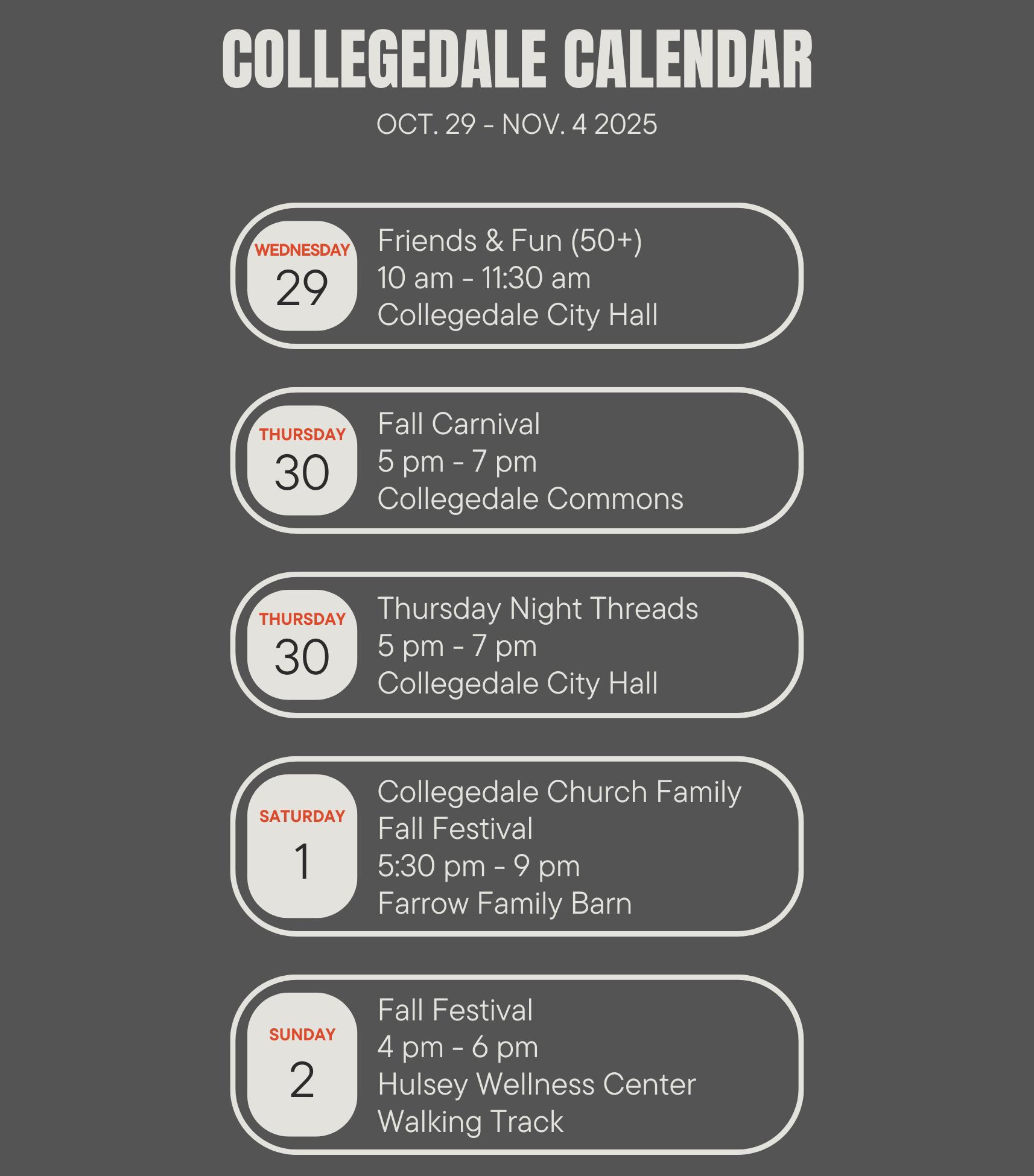
website in an effort to be more transparent with the public
CJ Jones Contributor
During an Oct. 20 Collegedale City Commission meeting, the Board of Commissioners unanimously approved plans to refresh the city’s official website through Revize Software Systems, marking the next step in improving transparency and accessibility for residents.
At the city commission meeting, City Staff Planner
Jason Allin advocated for the project, which is part of a broader effort to modernize city communication and make local services more accessible online. The new website will consolidate city information, offer a cleaner layout and meet ADA accessibility standards to ensure all residents can use it effectively, all concerns raised by City Commissioners.
City officials emphasized the need for an improved website during the meeting.
“I’ve always found our website to be terrible,” Mayor Morty Lloyd said. “[It’s] not user-friendly at all.”
Originally, the city had set aside $50,000 for a complete overhaul of its website. After discussion among commissioners and Allin, officials decided to continue working with the city’s current provider, Revize, which will save nearly $44,000.
“We thought it might be better just to stay with who we are; it’s working out for us,” said Allin when covering the upgrades for the website in the meeting.
Under the revised plan, the total project cost will be $10,050, including redesign and annual hosting fees.
According to Allin, the $3,100
annual hosting fee was already paid in July, and the remaining $6,950 redesign fees will begin once the contract is finalized.
Allin also added that the new website will prioritize ease of use, accessibility and compatibility with mobile devices.
“Our goal is to make it where you don’t have to scroll as much, and stuff is just right there in front of your face,” said Allin. “It’s going to be geared for mobile, because everyone’s usually on their phones when they’re looking.”
Commissioners expressed strong support for the redesign and the associated cost savings of staying with Revize.
“I love the fact that it’s saving $44,000 to stick with the same one,” said Commissioner Laura Howse.
Although not all city departments are currently on the same website, Allin mentioned that Collegedale plans to include them in future updates.
Commissioners raised concern over the websites’ ADA standards as well as ease of access to documents and videos. According to Allin, improvements will be made to the website in order to meet ADA accessibility standards as well as transparency by providing larger text options, as well as including archived videos and city documents.
“It is amazing how much it helps for the website to be accessible and searchable,” said Howse.
Allin mentioned that the city has until 2028 to meet the ADA requirements.
The city’s five-year contract with Revize includes ongoing
technical support and a free redesign in the fifth year, ensuring that the website stays up to date, according to the Revize web services sales agreement. Once completed, city commissioners believe that the redesigned website will give residents of Collegedale more streamlined access to city services, improved government transparency and a modern look.
In addition to the website changes, the city is planning to invite residents to help shape its branding assets. Through a design competition, participants will be able to submit proposals for brand resources, including a new logo and color scheme for city materials. The winner will receive a $2,500 cash prize, and the winning design will be used on signage around the city.
According to Allin, the branding initiative will not replace the city’s seal but will be used for social media and other marketing materials. Officials said in the commission meeting that they hope the project will encourage locals and students from nearby schools, including Southern, to participate.
“I love the idea of getting the community involved,” said Howse.



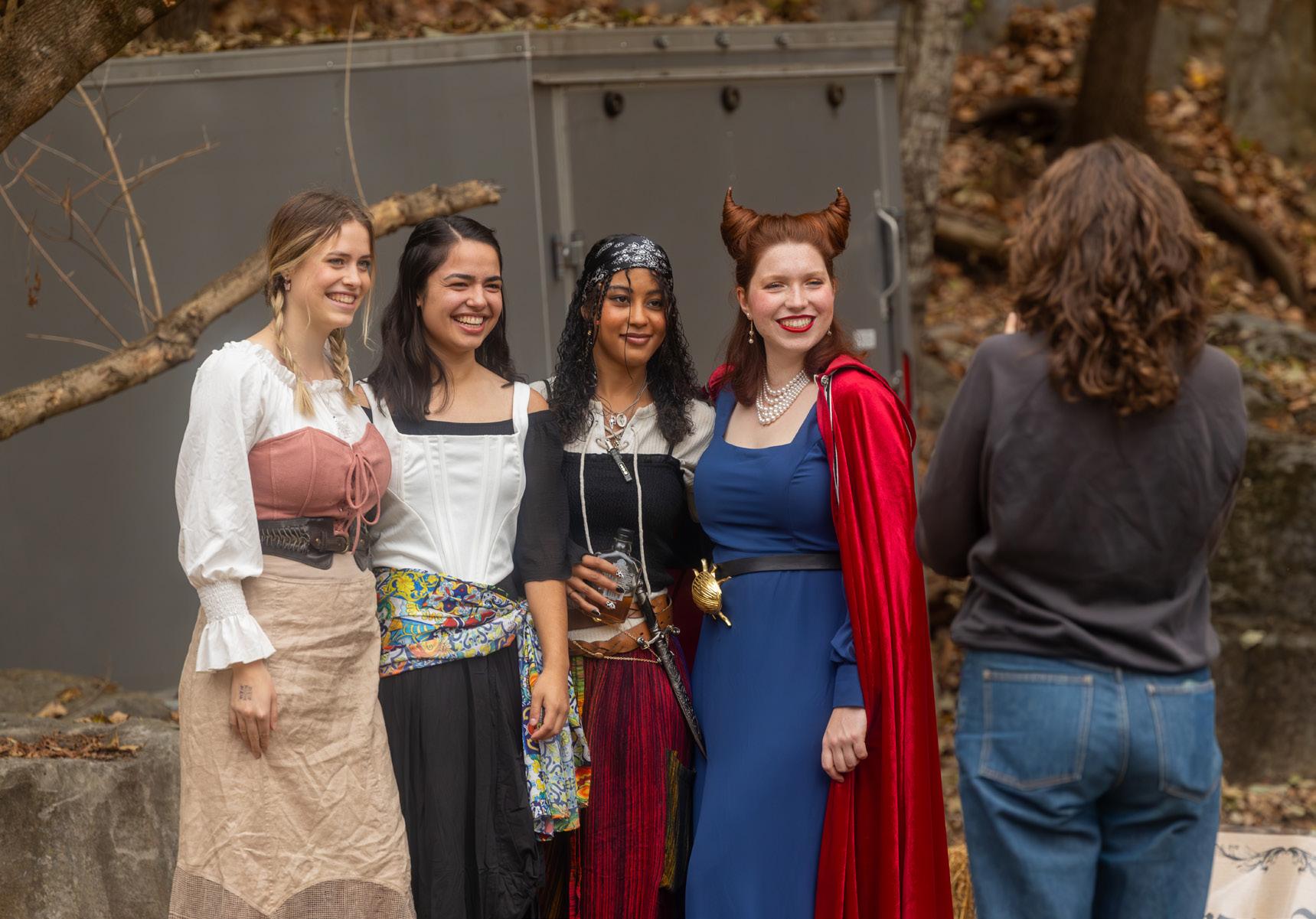
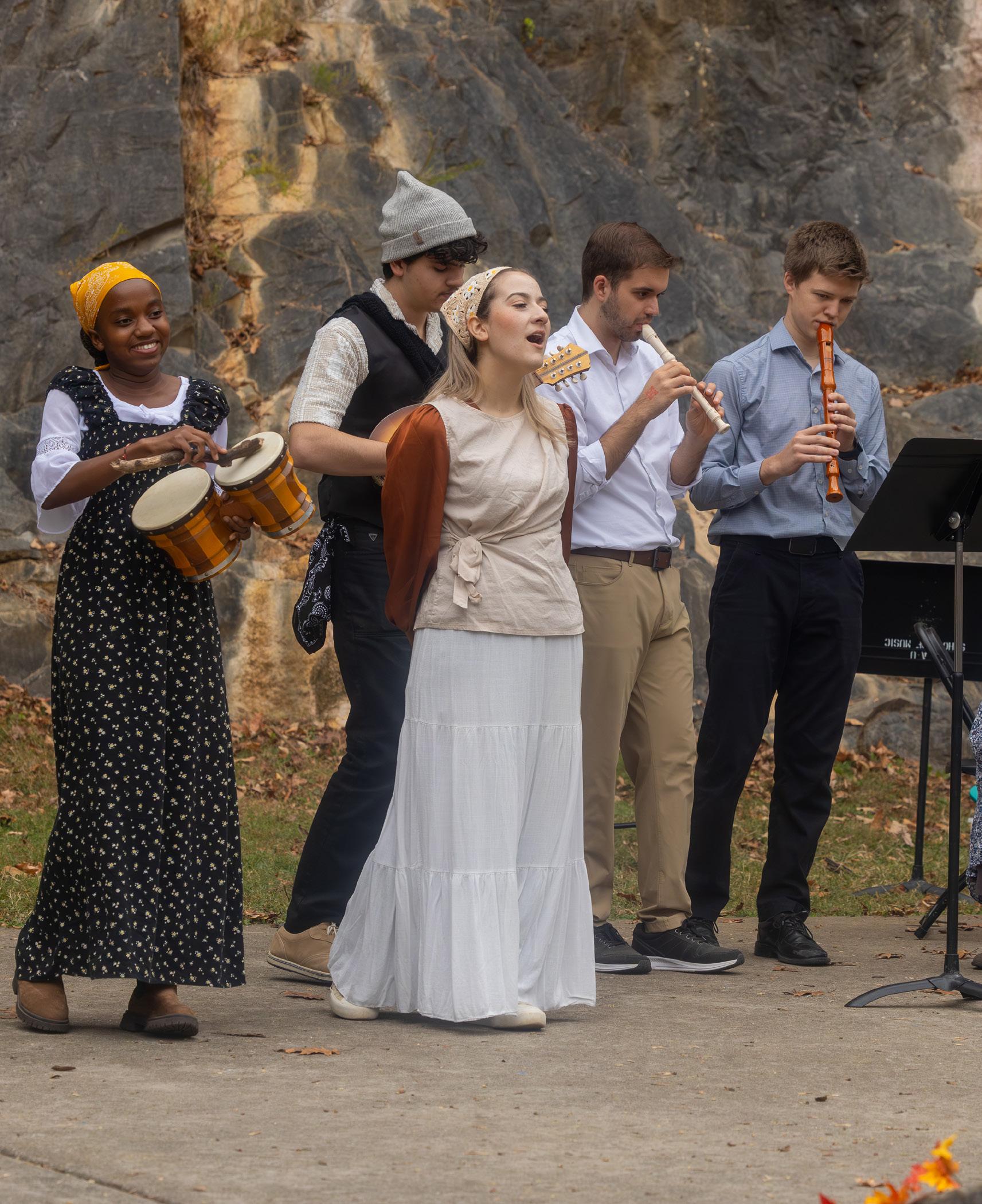
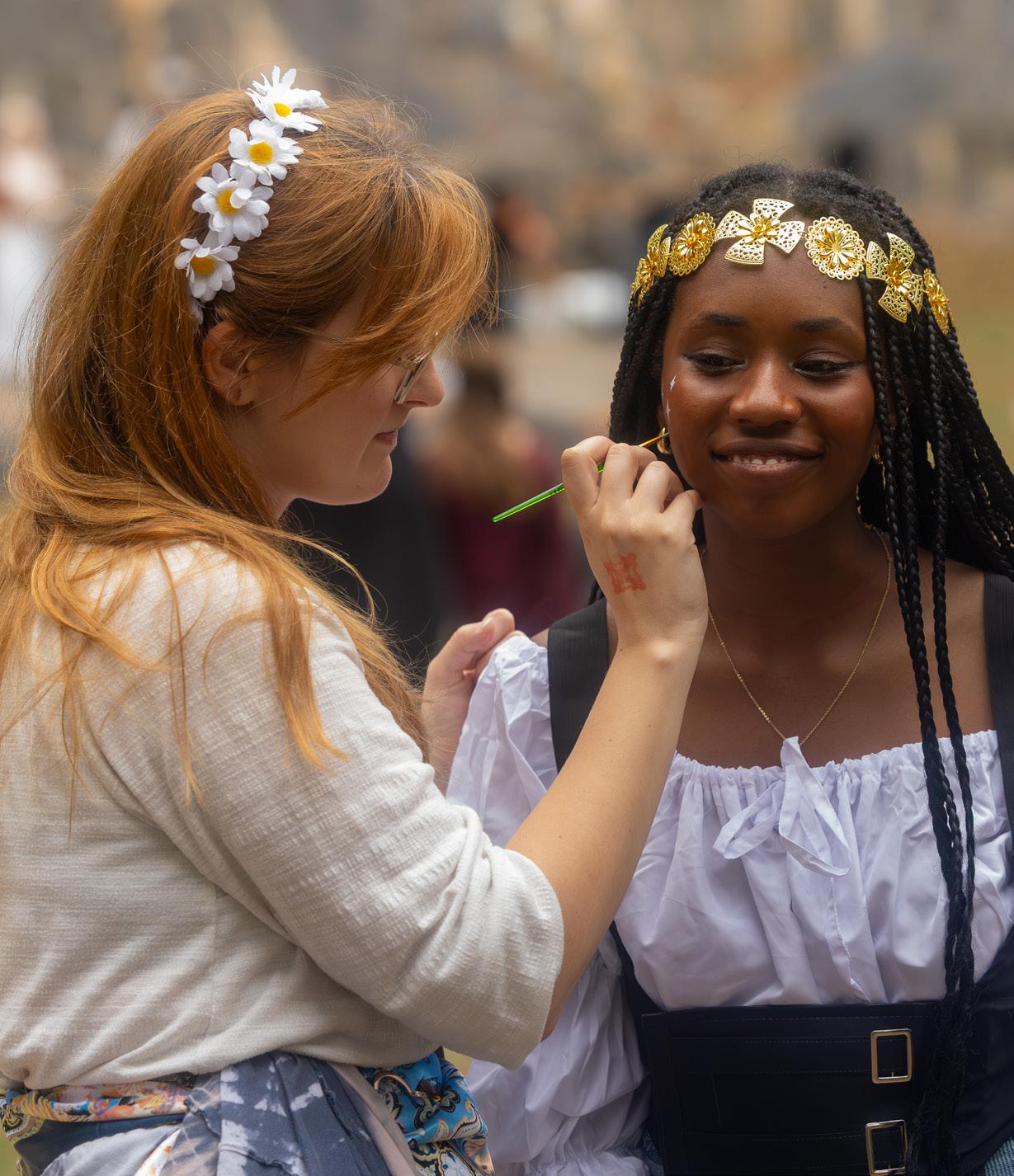


Abby Dizon Contributor
College is a time when selflove is truly tested. In high school, you might have felt a sense of competition with peers, and college can intensify those feelings. Since there are more people to compare yourself to, it is easy to question
yourself. Still, college offers an opportunity for nurturing self-love and discovery. Here are some strategies to help you improve your self-love. Start by treating yourself the way you treat your best friends. When your friends are feeling down or are beating themselves up, you normally encourage them with honest,
positive statements and remind them of their strengths and capabilities.
But here’s the thing: You are as human as they are, deserving the same amount and quality of kindness, support and compassion you give others. Similar to how you would want your close friends to believe the affirmations given to them, you
should also believe the positive affirmations that are directed to you.
I was never a big fan of positive affirmations. I felt they were insincere and created to make me feel better but had no truth behind them. However, I transformed my mindset and tried to think of myself from my friends’ perspectives. I began

“Building self-love takes time and dedication.” (Photo sourced from Pexels)
to believe that others genuinely see me in a different light and truly believe I am special, beautiful and smart.
By beginning to accept the sincere affirmations of others, you begin to break down the negative self-criticism. After all, if we believe the positive traits we tell our friends, even those they overlook, we should value the positive traits within ourselves.
Break the habit of comparing yourself to others. Whether online or in-person, we constantly measure ourselves against others in terms of physique, intelligence and success, devaluing our accomplishments and unique qualities. While not comparing yourself is easier said than done, this Pinterest quote explains why uniqueness is so important: “Flowers are pretty, but so are Christmas lights, and they look nothing alike.”
Just as flowers and Christmas lights are both beautiful in their own ways, beauty is subjective and can be found in unexpected places. Each of us is different for a reason; if everyone were the same, no one would be unique.
Building self-love takes time and dedication. It does not happen overnight and is only obtained through self-awareness and effort during a transformative journey. Upon reaching self-love, not only does it profoundly impact every aspect of your life, giving you the power to withstand any challenges, but you also gain confidence and a deeper self-connection.
Matthew Taylor Sports Editor
In July 2025, four members of the Advertising Club at Southern Adventist University, and their sponsor, attended a seminar by the Tennessee Titans marketing team. This was the first step in a year-long process that included an Advanced Campaign Research class, a multi-stage national competition, and a potential presentation to board members of the National Football League (NFL).
The Advertising Club is Southern’s student chapter of the American Advertising Federation (AAF), a national trade association that promotes and protects the advertising industry. One feature of the global organization is the National Student Advertising Competition (NSAC), the premier college advertising competition that provides more than 2,000 college students the real-world experience of creating a strategic advertising/marketing/media campaign for a corporate client.
Previous clients of the competition have been AT&T in 2025, Tide in 2024, Indeed in 2023 and the Meta Quest 2 in 2022. This coming year, the client is the biggest name in American sports: the NFL.
“The NFL being the client is thrilling,” said Michael Finch, the team’s faculty sponsor and associate professor in the School of Journalism and Communication. “It’s created a lot of buzz because it’s such an exciting client.”
For Finch, the “big league” challenge is the whole point.
“[The NSAC] puts our students on a playing field with the best students nationally,”
he said. “We’re on the same playing field and our game will naturally elevate.”
Competing in the NSAC is no easy feat.
“I’ve talked with professionals,” Finch said, “and professionals say the AAF pitch is actually harder than any pitch they’ve ever done. Professionals know if you’ve done the NSAC competition, you’re prepared.”
The student-players feel that pressure but are rising to the occasion. Taylor Moren, a senior mass communication major and the student director of the NSAC team, said the scale of the challenge is forcing the
team to think like professionals.
“The NFL brand has a massive cultural influence,” Moren said. “It challenges us to really think on a national scale, both creatively and strategically. I’m really looking forward to seeing what we can do with it.”
Like in any competition, the team dynamic is an imperative part of taking on such a venture. AAF President Michelle Mita, a junior strategy communication and advertising major, praised her teammates’ synergy.
“It’s really exciting to work with such a big company and the team I’m working with is very creative,” Mita said. “I’ve
learned a lot from the way we brainstorm and build ideas together.”
Right now, the team is in its “film study” phase: conducting deep research to develop their game plan. The goal, Finch explained, is to find the “big idea,” which he calls the “main tent pole” that the entire campaign will be built around.
To get there, the team is even planning a scouting trip in late November, attending the Tennessee Titans home game in Nashville against divisional rivals, the Jacksonville Jaguars.
“I actually don’t want to decide on a core key idea until we go to the football game,” Finch
said, “to just kind of experience that together and reflect.”
For these students, the stakes are high.
“I hope to gain hands-on experience,” Mita said, “that helps me apply what I’ve learned in class to real projects and prepare for my future career in the industry.”
It’s a long season, and the final pitch isn’t until next spring, but Finch is clear on the team’s ultimate mission.
“I would say advertising is a place that needs a lot of light,” he said. “And so, I hope this is a great opportunity for us to grow, as we shine God’s light through excellence.”

Samuel Guerra Opinion Editor
I opened Facebook for the first time in a while and saw this image: a golden retriever wearing aviator sunglasses, floating on a neon surfboard over a sunset ocean. “This made my day!” the user captioned it. The image was generated by AI.
It said nothing. It meant nothing. And yet, by the number of reactions and interactions, it probably traveled farther than most human thoughts ever do.
We are drowning in “slop.” In case you happen not to know this term, Cambridge Dictionary defines it as “content on the internet of very low quality, especially when it is created by artificial intelligence.” AI-generated content stripped of intention, history or consequence. It’s filler. And it’s everywhere.
From AI-written birthday wishes to synthetic landscapes captioned “peaceful vibes,” this content floods our feeds. And I have to admit: some memes have been entertaining. But their when they are often used to represent something that already exists in real life. Say the image of a parrot, but AI-generated instead of showing an actual parrot.
There is something called “dead internet theory,” which warned years ago that most online activity would come from bots, algorithms and AI-generated noise rather than from real humans. This theory used to sound like paranoia. Today, it feels like an observation.
On Sept. 30, OpenAI, the
company behind ChatGPT, launched its own “social media” app called Sora, often called the “TikTok of AI.” In this app, users scan their faces as input, and all the content is AI-generated—even their own faces.
Many users describe it as “peak AI slop” that merges mindless scrolling with algorithmically generated clips. Since its release it has been the #1 most downloaded app in the App Store.
Days after the app’s launch, OpenAI CEO Sam Altman announced plans to allow “even more erotica for verified adults,” pushing even further the boundaries of what AI-generated videos will be used for.
This content is designed for nothing but dopamine surges. No messaging friends or sharing about your day. No storytelling first, like other platforms were originally intended to be. It’s sensory bait, engineered to keep users hooked while their attention spans fry. That’s why I think even the term “social media” should not be used for it.
And who’s consuming “slop” most? Often, it’s older generations. Turns out that the people who grew up reading newspapers and watching broadcast TV are now unwittingly shifting to this content because it’s bright, simple and emotionally frictionless. They may not know it’s AI. They just know it “feels nice.”
Meanwhile, a contrast emerges when we observe how influential people approach this In Silicon Valley, tech insiders are sending their children to no-tech schools, banning smartphones at home and
delaying screen exposure as long as possible. Bill Gates and Steve Jobs famously restricted their kids’ tech use. Why? Because they understood what the rest of us are only beginning to see: attention is the scarcest resource of the 21st century, and it’s being strip-mined. This is the new class divide.
The wealthy protect their children’s minds. The rest of us get Sora. The irony is brutal. Those who built the attention economy are opting out of it; the rest of us, including our elders, are left to scroll through an increasingly addictive digital landscape.
We don’t need to ban this technology. But we must refuse to normalize its output and not treat it as human expression. A golden retriever in aviators isn’t joy, it’s a counterfeit. And if we keep treating fakes as real, we won’t lose just the internet— we’ll forget how to recognize Truth when we see it.

Nina
Bueno Religion Editor
What does that wonderful word mean—good? It’s the word that you will often hear when asking someone how they are. “Oh, I’m good,” they’ll say. But what do they actually mean? Often, it’s simply a cover-up for how they’re actually feeling. Or, “good” can describe the way we want our life to be. But sometimes, we realize that there’s nothing we can do to achieve a “good” life.
It’s all too easy to look back on some past time in life as “good” and compare it to where we are now. It’s too easy to look forward to some point in the future where things will finally be “good” again. This is especially true if you’re going through a trial. It may seem like despite all the struggles you may have endured in your life before, none of them can compare to your current obstacle. In the Bible, Jesus foresees these struggles for us. In John 16:33, He says, “In this world you will have trouble.” He doesn’t say you might have troubles. He doesn’t say that if you do this, or if you do that you will have troubles. He says that we will have troubles. It’s a promise. And I’m sure all of us can see evidence of this promise in our lives.
But Jesus does not leave us there. As the verse continues, He states, “But take heart! I have overcome the world!” Jesus tells us that despite the promise of troubles in this world and the promise that it won’t always be good, we should still take heart! We should still have hope and be happy! But why? You might be wondering just like me, why in the world should we have hope when not only are we amid
trouble in this world, but we are promised further troubles to look forward to. When will the good be here?
Jesus doesn’t just ask us to take heart for no reason. He doesn’t ask us to have hope for no reason. He asks us to have hope because of an alternate reality that isn’t always clear when we are in the midst of trouble. This reality is that Jesus has overcome the world. This isn’t even a future promise; it is a present reality! Jesus already overcame all the trouble in this world for us. He asks us to have hope because He has already cleared away the troubles and is bringing good for us.
In Romans 8:28, Paul writes, “And we know that in all things, God works for the good of those who love Him, who have
been called according to His purpose.” All things? Good? It doesn’t look like that right now, you may think. Things were good, sure. And I hope desperately that they will be good, someday, somehow. But there is no real evidence that they’re going to be good. Nothing seems like it will ever work out that way. But Jesus asks me to take heart, to have hope, to know that God will work for good. How?
This is what I was wondering when I heard this verse recently. I just couldn’t see any way that God could work for good in the things I’m going through. But after studying, I realized something. Perhaps “good” isn’t just a word to describe how we wish things were, how we wish we felt. Perhaps it isn’t just a
description of our circumstances or situations. What if it’s also a description of the character of God and of the character He desires to give us?
In the book of Romans, Paul’s use of the Greek word for “good” reveals just that. He doesn’t see “good” as something we will always experience. Of course, God can do that—He doesn’t desire us to live in sadness and trouble all the time, but when we do have troubles, as we surely will during life on this sinful earth, we may know that God is working for our good. He is working in order to bring edification and sanctification to our lives.
In and during all the things, all the troubles that happen in our lives, God will work towards our good. God will work to
bring greater good into our characters and mold them more closely into His character. The reason that Jesus overcame the troubles of this world is so that He could draw us each closer to Him. That’s why we can take heart. That’s why I can take heart. Because God’s purpose is that not one person should perish, but that all should come to repentance. And that includes you and me. In this world, we will have troubles. But God works even in those troubles to the good of our characters. He desires that we may grow to be more like Him, that we may be edified and sanctified through our life here. And someday in heaven, we shall be glorified, and both we and our circumstances will finally be wholly good again.

Eliana Morales Managing Editor
My appearance tells one story, but my language contradicts it. The characters from my early school memories look nothing like me, with their blonde hair and blue eyes.
It never bothered me that I was adopted, and it still doesn’t. The only ones affected seemed to be my elementary class, cornering me on the playground with a chorus of, “I feel so bad for you!”
When I see a Chinese woman depicted in a show or movie, my heart swells with pride. She is beautiful, and in a way, she is me. Double points if she has a monolid. But the moment she mentions a traditional dish or speaks in Mandarin, I’m completely lost.
I’m so lost that I had to use
Google to even recall a few Chinese dishes. In the meantime, I’ll list some foods I don’t need Google’s help to name: arepas, arroz con gandules, tostones, sancocho.
When I speak Spanish, I can practically see the gears turning in people’s heads. They think their eyes deceive them.
Then follows a question similar to, “Where are you from?
No, where are you really from?”
Or, “What is your…uh, heritage?”
And then we both sit through my long, rehearsed spiel about how I ended up this way.
Figuring out where I fit can be confusing. For example, Asian Club Night is not my night. The people on stage look like me, but their experiences feel so far removed from mine. So, I have decided that Latin
American Club Night is mine. But not as much as it belongs to others. Other people parade around in their traditional dress, proudly waving their country’s flag while I hesitate at the entrance to pick a flag that represents me.
Although I know the language, food, attitudes and stories, something as simple as missing a TV show reference or not knowing a dance makes me feel as if I don’t fully belong.
Of course, this belief is completely self-imposed, and I’ve come to the conclusion that the remedy comes through accepting my unique story. The more I talk about my experience, I find people who relate to me. Maybe they’re not Chinese with “Morales” as their last name, but they feel caught between cultures.
I’ve learned that cultural identity is not as straightforward for most people as I
thought it was. The reality is that we live in a country where people come from everywhere. Although we find people like us and bond over shared culture, we also create a new culture.
Our new culture is rooted in what our parents passed down, but it contains curiosity and openness towards things that are different.
Gen Z is particularly good at having conversations that revolve around identity, and I
have been pleasantly surprised by the number of experiences that parallel mine.
Maybe people like us aren’t meant to chase identity in a single culture, but to turn inward and see it in the life we’ve created. Instead of thinking we belong nowhere, we can realize that our complex background equips us to relate to many. The experience that once felt isolating becomes intriguing, beautiful and worth sharing.
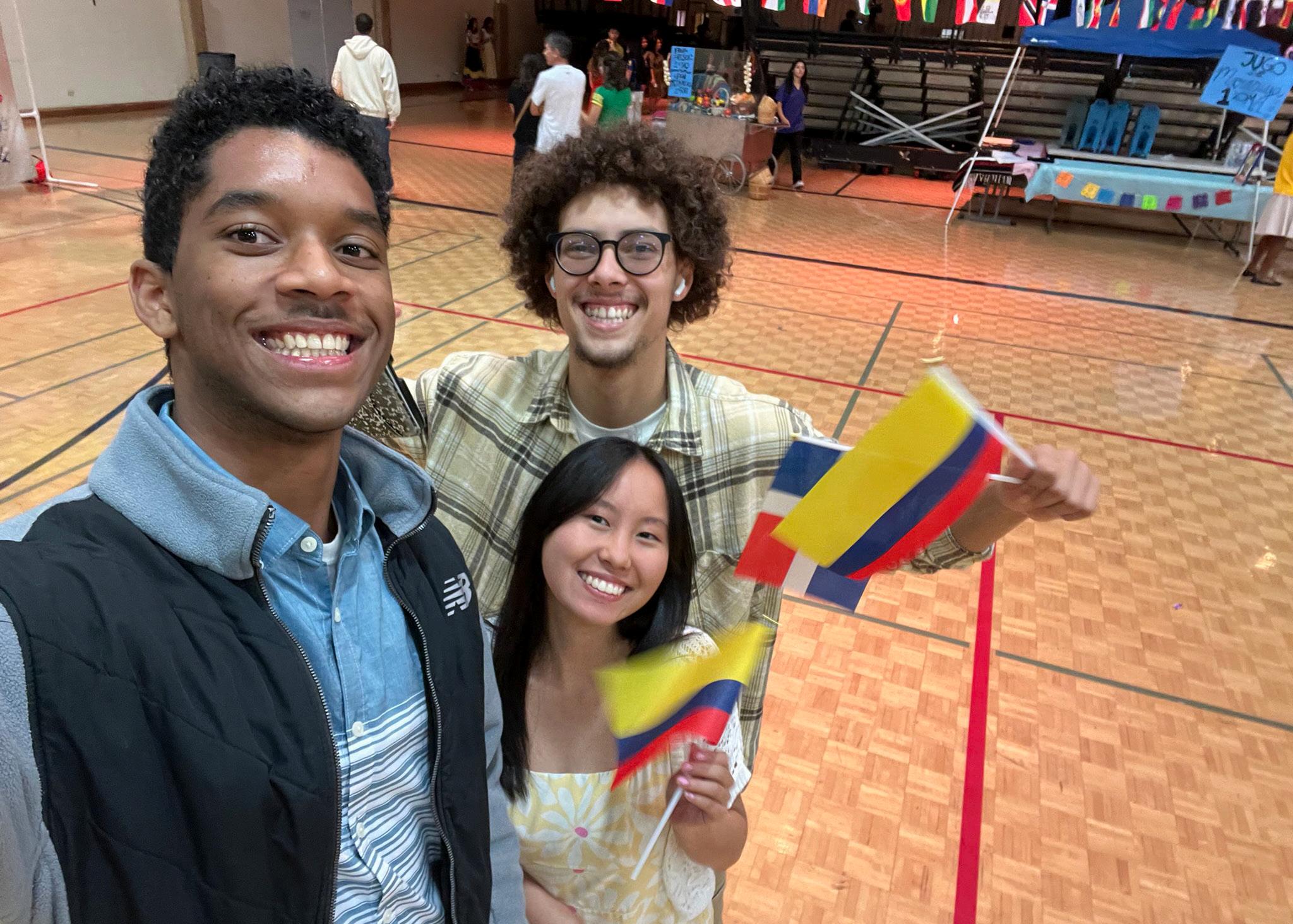
Created by Nyah Jackson


5:00 pm Floor Hockey Captain’s Meeting @ Husley Wellness Center Amphitheatre 7:30 pm Recital: General #4 @ Ackerman Auditorium

• Payday: Salary

Flag Football
MEN’S B PLAYOFFS @ 6:00 pm
LADIES’ B PLAYOFFS @ 7:00 pm
MEN’S A PLAYOFFS @ 8:00 pm


• Payday: Hourly/Students
• 6:30 pm Vespers: Student Association, Jonathan Montes @ Collegedale Church of Seventh-day Adventists
6:47 pm Sunset
7:30 pm Star Watch @ Hickman Science Center Parking Lot
7:30 pm AfterGlow @ Collegedale Church of Seventh-day Adventists
8:30 pm Vespers: Student Association, Jonathan Montes @ Collegedale Church of Seventh-day Adventists
• 4:00 pm - 6:00 pm Fall Festival @ Hulsey Wellness Center Walking Track
Friday — 31 Sunday — 2 Tuesday — 4
11:00 am - 12:00 pm: Seniors Today, Alumni Tomorrow: Fall Semester Workshop @ Wright Hall Presidential Banquet Room
• 12:00 pm: Tornado Siren Test
• 9:00 pm: Seniors Seniors Pre-Registration (94 Earned Hours) @ Online MyAccess
Last Day To Drop A Class (16-Week Classes) Last Day for 40% Refund 11:00 am Convocation: Arthur Benjamin, Mathmagics! @ Iles P.E. Center
• 10:00 am - 11:15 am French Sabbath School @ Lynn Wood Hall Room 3050
• 5:00 pm Evensong: Southern Ringtones @ Collegedale Church of Seventh-day Adventists
• 8:00 pm Allied Health Pickleball Tournament @ Iles P.E. Center

- Chain Movers vs 67 (Men’s A)
- Lowkey Down vs Funky footy freaky (Ladies’ A)
LADIES’ A PLAYOFFS @ 9:00 pm
- Blitzcraig vs Team Rex (Men’s A)
- shake & bake vs The Real Slim Bradys (Ladies’ A)
Intramural Schedule: Wed
Flag Football
LADIES’ B FINALS @ 6:00 pm
MEN’S B FINALS @ 7:00 pm
LADIES’ A FINALS @ 8:00 pm
MEN’S A FINALS @ 9:00 pm

December Senior Deadline For Correspondence/Transients/Incompletes “Step Forward” (November 3 - 14) Floor Hockey Season Begins
• 3:30 pm Undergraduate Curriculum Committee @ Wright Hall Robert Merchant Room • 9:00 pm Southern Scholars Pre-Registration
Corrections:
In last weeks’ issue, the Sports column was written by reporter Ava-Caroline Schmidt and the Opinion column was written by copy editor Allison Grundy.
Become an advanced practice nurse and earn a doctor of nursing practice at the same time.
The BSN to DNP program mentors bachelor’s degree-level graduates as they gain necessary RN experience through an advanced nursing practice emphasis of their choice.
Options include:
• DNP/MBA
• Lifestyle Medicine
• Nurse Educator
• Nurse Practitioner (emphases include Acute Care–Adult/Gerontology, Primary Care–Adult/Gerontology, Family, and Psychiatric Mental Health)
Call or visit online to find out how to get started.






